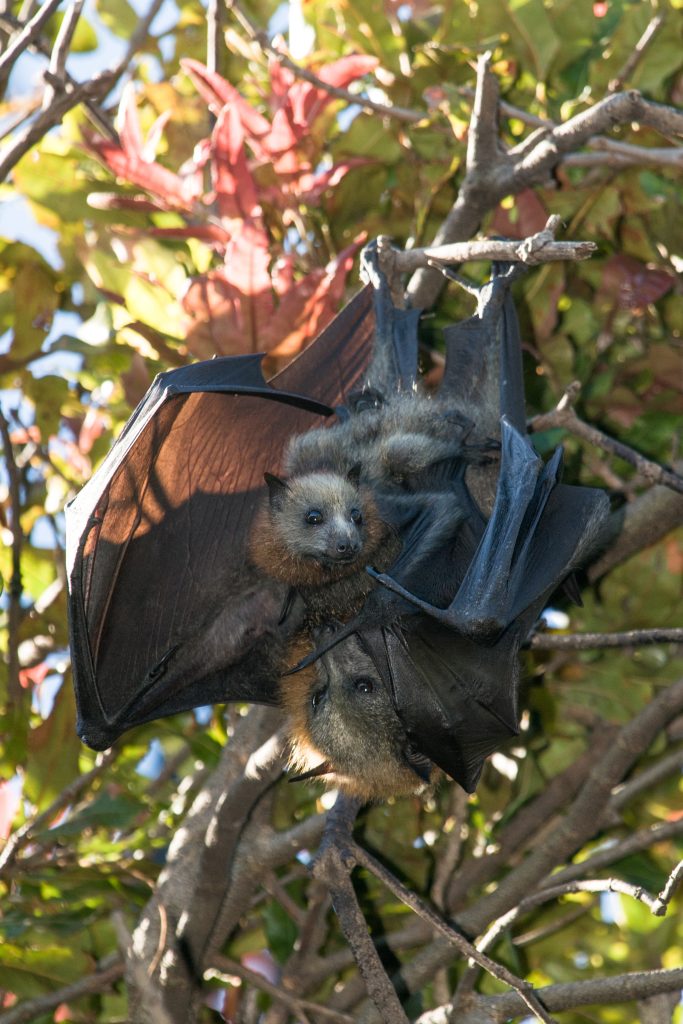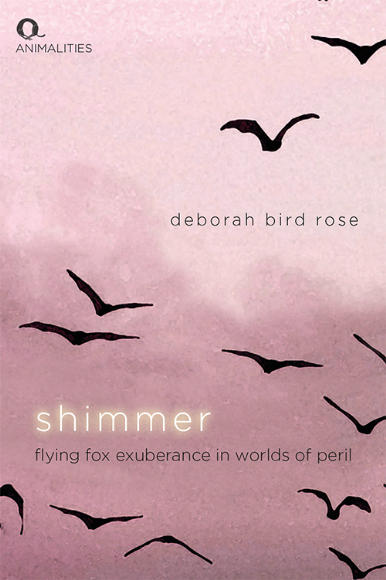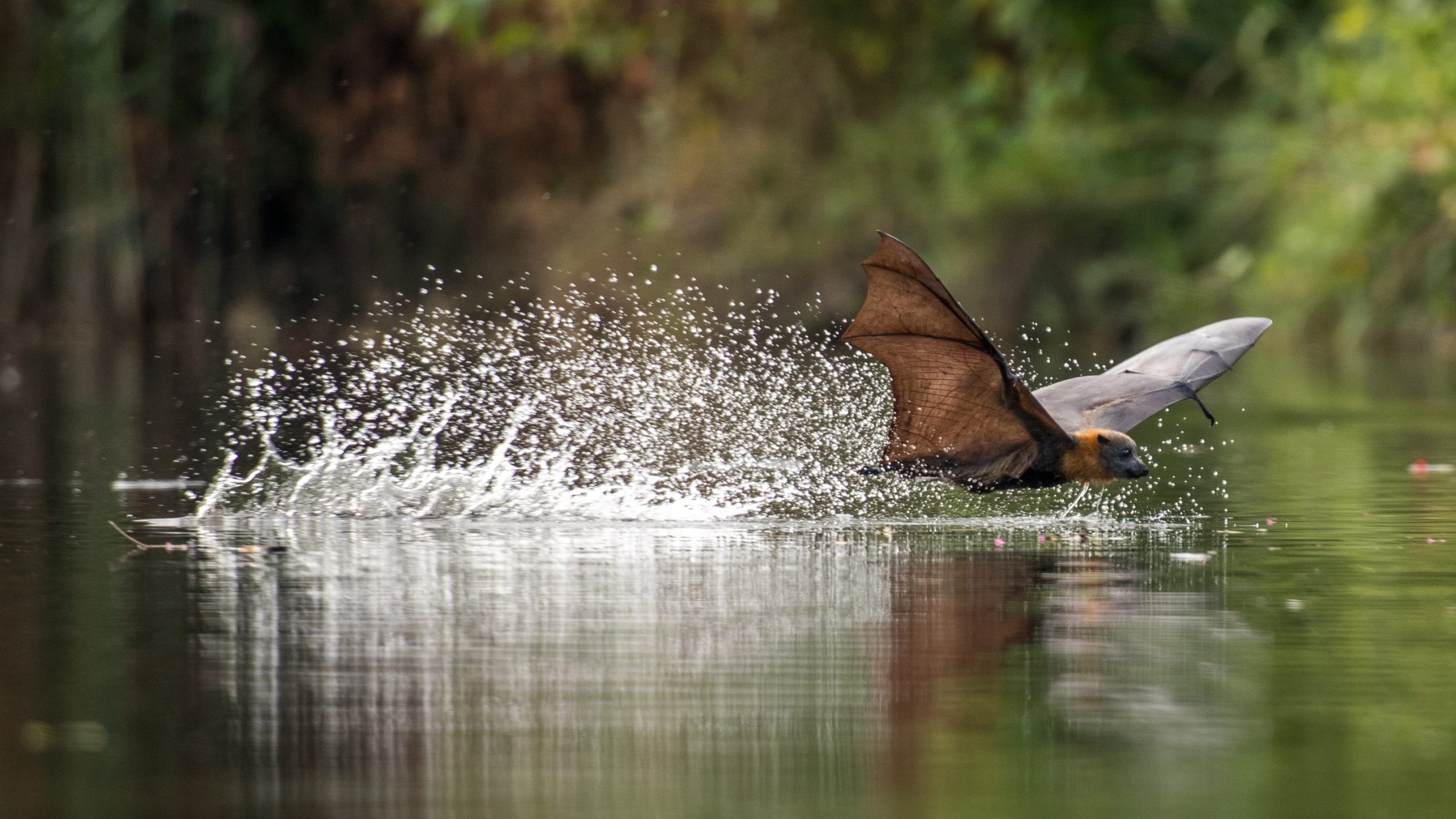
An extract from Shimmer: Flying Fox Exuberance in Worlds of Peril by Deborah Bird Rose
Australian anthropologist Deborah Bird Rose’s remarkable final book is a landmark piece of interdisciplinary, multi-species scholarship based on fieldwork with the zoologists, conservationists and Aboriginal communities surrounding the imperilled flying fox. A powerful work engaging with philosophies of ancestral power and ecological ethics, it is written with the exuberance and sense of wonder at the beauty, resilience and hope she discovered in working in the world of flying foxes.
Eucalypts and flying-foxes come together every year with beautiful timing and exquisite generosity, giving each other great kisses that bring forth new generations of life. Let us consider the lush, extravagant beauty, flamboyance, and dazzling seductiveness with which Eucalypts say ‘Yes!’. They burst open sequentially, even patchily. And when they burst, every twig says ‘Yes!, More!’ – more buds, more flowers, more colour, more scent, more pollen, more nectar – more, and more, and all that can be conjured from within the tree to reach out into the world with this great, vivid, multi-sensorial call: Yes!

For their part, flying foxes respond to the call of Eucalypts and Melaleucas with their own ‘Yes!’ They sense this great call, and they come racing to the blossoming trees. Their ‘Yes!’ includes their long tongues that are perfectly adapted to sucking up nectar, and their delicate whiskers that pick up pollen and distribute over 70% of it intact. They carry the future of eucalypts on their furry little faces, and across the patchy and increasingly fragmented landscapes of contemporary Australia, the renewal of woodland and forest life hinges on this specific ‘Yes!’ A new generation of trees is carried on the fur and the tongue, and on the wings that beat through the night carrying the animal to the tree, and carrying the tree’s gifts along to other trees. And a new generation of flying foxes is nurtured into life with lashings of glorious nectar.
There is a foundational ethics within this multispecies kiss. This is the kiss that teaches us that others enable our lives, that others come first because we owe our lives to them. As an ethics, this beautiful, located, embodied, life-affirming, mutually giving and receiving, historical and future-oriented kiss offers a great and seductive lesson: to be for one’s self one must always, also, be for others.
Want to keep up to date on our latest Philosophy books? Sign up to our mailing list.
About the book

Beautiful, persecuted, fragile, resilient: how flying foxes help us confront every big question facing life on earth today
- Draws on etho-ethnographic fieldwork with flying fox scientists, conservationists and rehabilitation carers, as well as with Australian Aboriginal communities – a leading example of interdisciplinary, multispecies scholarship
- Paints a vivid portrayal of the art of multispecies care amidst ongoing peril
- Eloquently reflects on death and persecution in a time of extinctions
- Elaborates Aboriginal philosophies of ancestral power, brought into contact with other philosophical and scientific traditions
- Engages with decolonial ecological ethics and contributes to environmental philosophy
- The highly anticipated final book by the leading anthropologist and environmental humanities scholar Deborah Bird Rose (1946–2018)
About the author
Deborah Bird Rose (1946–2018) was a world-renowned anthropologist and leading figure in the emergence and shaping of the interdisciplinary environmental humanities. Over the course of a career spanning almost 40 years, Rose published many widely read, cited, award-winning and often-reprinted books, including Hidden Histories (1991), Dingo Makes Us Human (1992), Nourishing Terrains (1996), Country of the Heart (2002), Reports from a Wild Country (2004) and Wild Dog Dreaming (2011).





